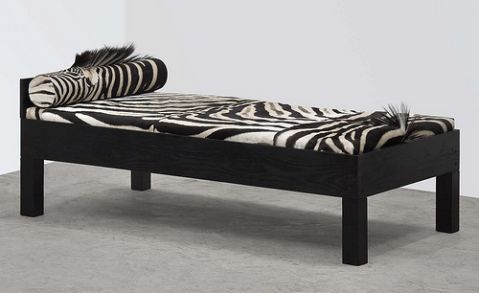- Venue
- South London Gallery
- Location
- London
For his first solo exhibition in London, Rashid Johnson (born 1977, Chicago) has created something of a parallel universe in the South London Gallery. Known for using familiar domestic materials in his work (“hijacking the domestic,” as he terms it), Johnson has turned the main ground floor gallery space into a topsy turvy kind of a hospital ward, or Shelter, in which psychotherapy is a freely available drop-in service, accessible to all in group sessions. The result is quite uncanny, with the row of four beds, placed on rugs, down the centre, the hanging plants above, and the books stacked on a mirrored shelf to the side, all creating a sense of familiarity and homeliness, but simultaneously the charred frames and zebra skin bed coverings, the black tones in the Persian carpets, and, if one looks more closely, the dark stains upon them, and, most of all, the black paintings and cracked mirrors hanging on the walls, all stir up a sense of unease and suggest some sinister foreboding.
The “paintings” are in fact branded or burned red oak flooring, covered with black soap and wax, and drawn and scratched into, heavily gouged, with circles and crisscross lines, echoing the chaos of a disturbed mind and the darkness within, into which the subject is digging deep, perhaps in an attempt to purge. Similarly, the mirrored tiles and shelves in The End of Anger, upon which six copies of a book of the same title are stacked, and an Art Blakey 3 Blind Mice Jazz Messengers vinyl displayed, are daubed with smears and splats of black wax, seemingly thrown at the glass with some aggression, dripping down and splattering out, with cracks from the violent impact, and scratches on the mirrored surface all around. Oyster shells are also perched on the shelves, filled with shea butter – perhaps some failed therapeutic attempt to create an oasis of calm and alleviate pent up agitation?
The beds are not inviting either. Only one is the right way up, with one on its side, and two upended. And the stains seeping out from underneath, across the carpets, appear to be written into as well, although what the lines and signs might wish to convey is anyone’s guess – again, the workings of an afflicted mind?
Upstairs, in the first floor galleries, Johnson has curated a small six work exhibition showing pieces by Robert Davis, Sam Gilliam and Angel Otero. The latter’s two contributions consist of wrinkled oil paint skins, collaged on to canvas and painted in metallic colours, so as to suggest, to me at least, oversized crumpled chocolate wrappers, stretched out over the canvases. Gilliam’s piece, One Situation, dating back to 1970, appears like a hanging cloak, or painter’s smock, besmirched with paint smears and drips, but yet beautiful and clear in its colours. Finally, Davis’ three works are abstract crisscross patterns across otherwise bare and unprepared canvases, Ghost Face using pale blue paint, but Wine No. 1 (Cabernet) and Coffee and Cigarettes both, like Johnson’s own work, turning to everyday materials (here giving the names to the works) to leave their stain. How these pieces relate to the therapy room downstairs, one can only speculate – are they the result of art therapy sessions, or rather of the decadent lifestyles which led to the need for therapy in the first place? Sometimes the differentiation between the paths to breakdown and recovery are not altogether clear.




